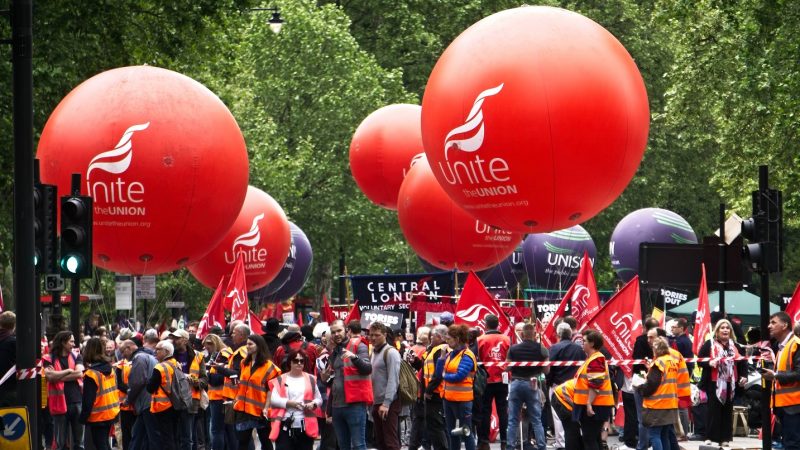"It makes no sense to promise repeal of just one or even two parts of this process, we need a root and branch approach to introduce a new framework of guaranteed rights and freedoms that will repeal the whole edifice of anti-union laws in place since 1980."

The decision at the end of October by the Communication Workers’ Union to call off planned industrial action, seemingly in the face of a legal challenge by Royal Mail on grounds that at the moment have not been disclosed, shows the extent of the procedural knots the anti-union laws have tied around unions and their members.
As one CWU activist tried to explain, thereby exposing the banality of the law: “Given the letter received [from Royal Mail] on Friday … two extra days [of action] were called/announced on Friday evening. So while 6 days of action have been stood down to stop a legal challenge this was a total of 2 days per individual [member]. This has been replaced by two days of all out action … on Saturday 12th and Monday 14th November so overall it is the same amount of action per individual [member].”
In his speech at Labour’s recent Conference Keir Starmer made a number of trade union and worker rights policy commitments: an end to fire and rehire; abolition of zero hours contacts; a number of equalities measures; single status of workers; fair pay agreements [sectoral collective bargaining] starting in social care, and a promise to repeal current Tory proposals and the 2016 Trade Union Act.
Most, if not, all of these pledges, other than on the current wave of Tory law, were set out in Labour’s Green Paper A New Deal for Working People endorsed by Conference in 2021.
In the dying days of the Johnson government two changes to the law were made using secondary legislation, meaning they were hardly subject to any Parliamentary oversight.
Firstly, the use of agency labour as a substitute workforce when an employer was strikebound was made lawful. Secondly, the amount of statuary damages a union may have to pay an employer for supporting its striking members was increased, in the case of large unions this sum was set at £1 million. The TUC is pursuing these issues through the courts as they represent a further limitation on workers’ right to strike.
The Johnson Government also signposted a major change to the law that became a step nearer under Truss with the publication of the Transport Strikes (Minimum Service Levels) Bill and which has not be disavowed by Sunak.
The change is intended that a union, initially in the transport sector but easily extended to other essential services, will have to agree with an employer that a sufficient number of its members remain at work during a strike to provide a minimum service. In other words, unions would be obliged to negotiate with an employer they are in dispute with an agreement that would undermine its own strike.
The government seems not to have proceeded with a fourth measure that would have required a union to ballot its members on every offer made by an employer, an invitation for employers not to bargain in good faith.
As a minimum it should be expected that an incoming Labour government would not have a problem in repealing these latest changes to the law and with keeping its promise to also repeal the changes made by the 2016 Act.
At the time of writing it is unclear if Royal Mail was alleging that the CWU had fallen foul of some aspect of the 2016 Act or had transgressed some arcane provision of earlier legalisation which, to remind ourselves, go back to 1980 to the days of Margaret Thatcher as Prime Minister and a succession of Employment Secretaries including the notorious Norman Tebbit.
The current changes to the law represent a tightening of the screw on trade union rights – especially on the right to bargain and the right to strike. We should see this as a process; there is a continuum from the Thatcher-Major period, through the Cameron-May years and into the Johnson-Truss-Sunack era.
It makes no sense to promise repeal of just one or even two parts of this process, we need a root and branch approach to introduce a new framework of guaranteed rights and freedoms that will repeal the whole edifice of anti-union laws in place since 1980.
The Campaign for Trade Union Freedom in association with the Institute of Employment Rights is organising a major conference opposing the anti-union laws Campaigning for Free Trade Unions on Saturday 3 December in London. Registration and further details can be found here.
Adrian Weir is the trade union liaison officer at Hornsey & Wood Green Constituency Labour Party and Assistant Secretary of the Campaign for Trade Union Freedom
Image credit: Garry Knight – Public Domain
To reach hundreds of thousands of new readers we need to grow our donor base substantially.
That's why in 2024, we are seeking to generate 150 additional regular donors to support Left Foot Forward's work.
We still need another 117 people to donate to hit the target. You can help. Donate today.



